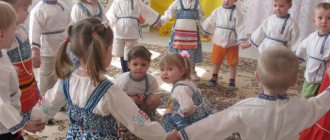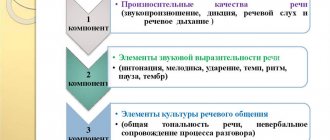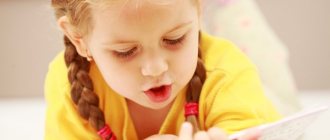Distance education
Planning work on ZKR in the older group (children 5-6 years old)
- Main areas of work:
- Formation of pure and correct pronunciation of all sounds of native speech
- Development of auditory perception, phonemic hearing
- Development of prolonged oral exhalation, speech breathing
- Work on intonation expressiveness of speech (voice height and strength,
- word stress, diction development)
- Development of fine motor skills
- Working on the morphological drawing of a word
- Recommendations for planning work on ZKR:
- As an element of speech development in educational areas, it is carried out at least 2 times a week
- In the calendar plan, work on the development of the respiratory system (breathing, auditory attention, intonation) is taken into account daily
- Fine motor skills are also developed daily
- The planning should reflect individual work, recommendations of the speech therapist teacher for working with children, depending on the level of development of their speech skills
Didactic games and exercises:
- Games for differentiating sounds - 7g, p.60..., speech therapy lotto, dominoes, “Magic cubes” (for onomatopoeia and articulation),
- “Magic bag”, “Sound clock”, “Fishing” (7d, p. 28),
- “Logic Train”, “Whose House?” (7d, p.47),
- “Who will pack their things faster?” (7d, p. 49),
- “Pick up a bouquet” (7d, p.52),
- “Find a Pair” (7d, p.53), “Shop” (7d, p.50),
- “Train” (7d, p. 61),
- “Find a place for the picture” (7d, p.29),
- “Artists” (7c, p.99), “Whose story is better?” (7c, p.99),
- “I know 5 names...”
- “Name the products” (76, p. 141),
- “Guess the last word” (addition of poems, phrases - 7e p. 59),
- “Who will see more?” (finding words with a given sound in the picture),
- “Who is more faithful and faster?” (you can work similarly with any differentiated sounds) (7e, p. 30),
- “Who will remember more?” (selection of any words - all parts of speech - with a given sound), “Isolate the necessary words from phrases” (7c, p. 47),
- “Who will we hear more?” (selecting words with a given sound from a listened text), making sentences based on plot pictures, stories based on a series of pictures, staging fairy tales. Games for differentiating sounds – 7g, p.60…
- Games and play exercises used to develop general speech skills:
- Development of auditory attention , speech and phonemic hearing:
It is necessary to have sounding toys and music in the group. instruments (hammers, bells, metallophone, tambourine, pipes, drum, rattles...), diagrams, sound rulers,... Work on distinguishing and reproducing similar sounds, a series of sounds. Practice the ability to reproduce a series of sounds at different tempos.
Didactic games for the development of auditory attention:
- “Repeat after me” (“Parrot”, “Tape Recorder”),
- “Seller and buyer” (7d, p. 16),
- “Telephone” (7 l, pp. 89,94),
- “Who heard what?” (7g, p.15,16),
- “Who called?” (7g, p.22),
- “Where does it sound?” (7g, from 15),
- “Blind Man’s Bluff” (with sounding objects, with a voice - 7g, p. 18),
- "Whose voice?" (birds and animals - 7g, p. 21),
- “Who hears better?” (7 l, p. 89),
- “Echo” (7 l, p. 89),
- “Commotion”, “Wind and Birds”, “Sun and Rain” (7g, p. 19,20),
- “Snail” (7d, p.22),
- “Frog” (7d, p.22), poetry, fables...
Didactic games for the development of phonemic hearing:
- “Birds - titmouses”, “Riddles of words” (“TV”, “What are their names?” - 7d, p. 59,60), “Hide and Seek of Words”, “Chains of Words” (7d, p. 44), “Traces words", puzzles, "New Year's flags" (7e, p. 15)), "Word relay race" (7e), "What sound does your name begin with?", "Collect a pyramid" (7e, p. 14), "Find mistake and name the word correctly” (76, p. 151), “What sound is missing in the word?” (76, p. 150), “Magic Rug”, “Rhymes” (desktop-printed and oral version),... + d/i from point No. 3
- Development of the articulatory apparatus:
Required:
- cards of games and exercises for articulatory gymnastics (7zh, 7z, 7d)
- fairy tales about the "Merry Tongue"
- It is advisable that the teacher have material containing a description of the structure of the organs of articulation when pronouncing the sounds being studied (7l, 7z)
- Development of long exhalation, speech breathing:
The group should have games and play material for the development of long-term smooth exhalation (tissue paper aids, leaves, snowflakes, pendant toys, pinwheels, light blowing toys, inflatable toys, balloons, soap bubbles, pieces of cotton wool, pipes,...) It is necessary to make a card index of games and breathing exercises.
Didactic games for developing long exhalation:
- "Footballers"
- “Whose snowflake... will fly next?” (7g, p.40),
- “Whose steamer sounds better?” (7g, p. 40),
- “Recognize by smell” (any aromas - 7g, p. 40),
- "King of the Winds"
- Gurgling" (blow into water through a straw),
- "Who is stronger?" (to blow off a light scarf... - 7 l, p87),
- "Bubble." (differentiation S - Ш - 7g, p. 42), "Blizzard" ("Beep" - 7d, p. 51)
Didactic games for the development of speech breathing:
- “Come up with a phrase” (7d, e.44),
- “Name your neighbors” (7d, p.44),
- “Echo” (repeat the phrase),
- “The Magic Mirror” (7d, p.45),
- “Locate the place of the toy” (7d, p.49),
- "Who will win?" (7d, p.52)
- Work on the expressiveness of speech: (tempo, rhythm, verbal and logical stress, diction...):
Practicing the pronunciation of tongue twisters, tongue twisters, and poetry.
Dramatization games, round dance games. “Say a phrase with ... mood”, “Highlight a word in a phrase with your voice”, “Your mood”, “Secret”, “Broken telephone”, “Cat and mice” (children are forced to speak slowly), “Blizzard” (7d, p. 51)
- Development of fine motor skills:
The group must have:
- card index of finger games, speech with movement
- various mosaics with small details, construction sets, beads made from small beads.
- tutorials for braiding, buttoning, lacing
- tutorials for shading, stencils, labyrinths, stamps, “Lay out a pattern from sticks”, ...
Didactic games for the development of fine motor skills:
- “Piano”, “Magic bag”, “Find a pair” (buttons or other paired small items),
- “Dry finger pool” (7i, p. 74),
- “Clothespins” (7i, p.67),
- "Make a chain (paper clips)"
- "Finger Theater"
- "Shadow Theater"
- "Fanta"
- “Drawing with scissors” (7i, p.69,75),
- “Embroiderers” (7i, p.70), “Find a surprise” (7i, p.66),
- "Motley rug"
- Organization of the ZKR corner:
- For the corner it is necessary to allocate a specific place where the following should be collected:
- systematized speech and visual material
- card files of games and exercises. for the development of fine motor skills
- card files of games and exercises. on the development of breathing
- card files of articulation exercises
- card files of games and exercises. on the development of breathing
- card files of games and exercises. on the development of auditory and speech attention
- card file of speech material for working with studied sounds
- Material for the development of fine motor skills should be accessible to children (except for very small parts)
- The corner is replenished monthly:
- speech and visual material according to plan
- material for the development of general speech skills and fine motor skills according to these recommendations at the discretion of the teacher
- any training for working with sounds and for developing general speech skills
- Recommended reading:
- A. Efimenkova L.I. “Speech Formation in Preschool Children”
- b. Maksakov A.I. “Is your child speaking correctly?”
- V. Maksakov A.I., Tumakova G.A. "Learn by playing"
- Ed. Seliverstov V.I. “Games in speech therapy work with children”
- D. Shvaiko G.S. “Games and play exercises for speech development”
- E. Aksenova A.K., Yakubovskaya E.V. “D/i in Russian language lessons in grades 1-4. aux. school."
- and. “Tru-la-la” from the series “Karapuz”
- h. Budennaya T.V. “Speech therapy gymnastics”
- And. Galanov A.S. “Mental and physical development of a child from 3 to 5 years old”
- K. Borodich A.M. “Methods for the development of children’s speech”
- l. Khvattsev M.E. “Speech therapy work with preschool children”
- m. Ed. Ushakova O.S. “Speech development classes in the Danish garden”
- n. Gerbova V.V. “Classes on speech development in the senior group”
Speech therapist teacher
E. S. Mikushina , highest qualification category
| Methodical piggy bank |




